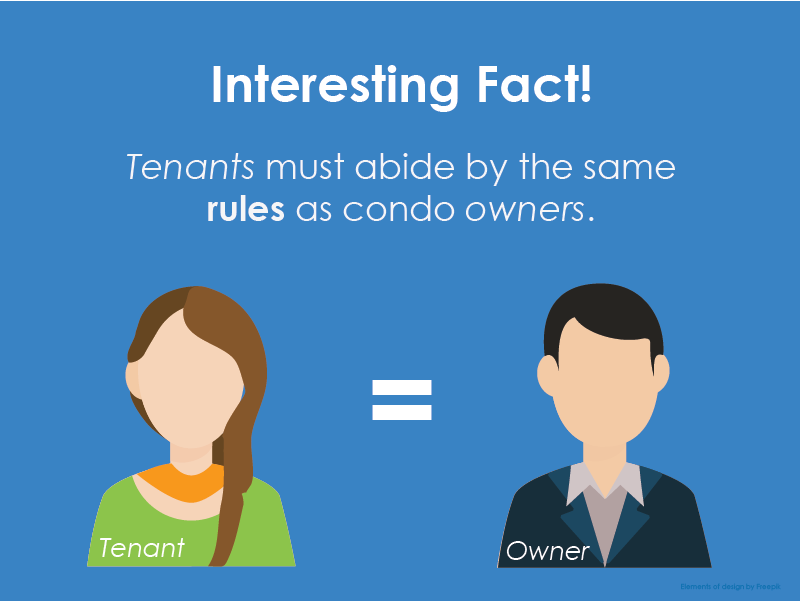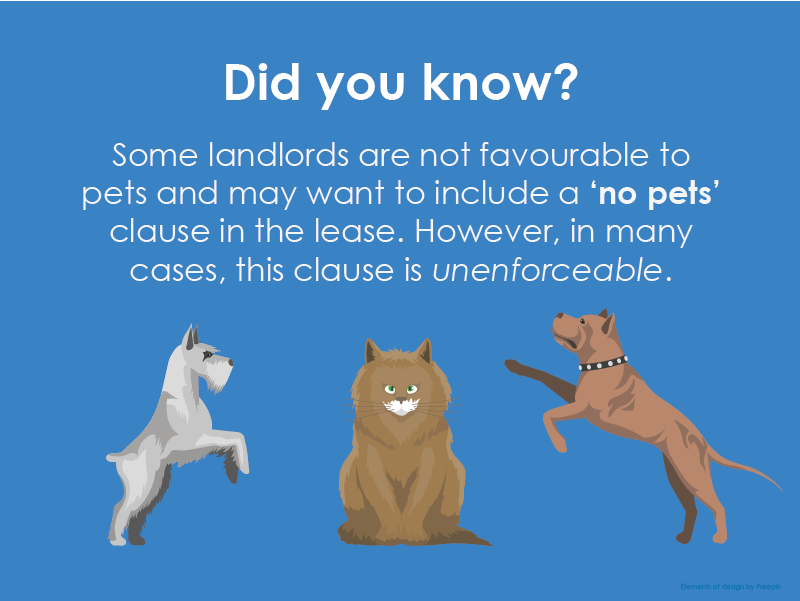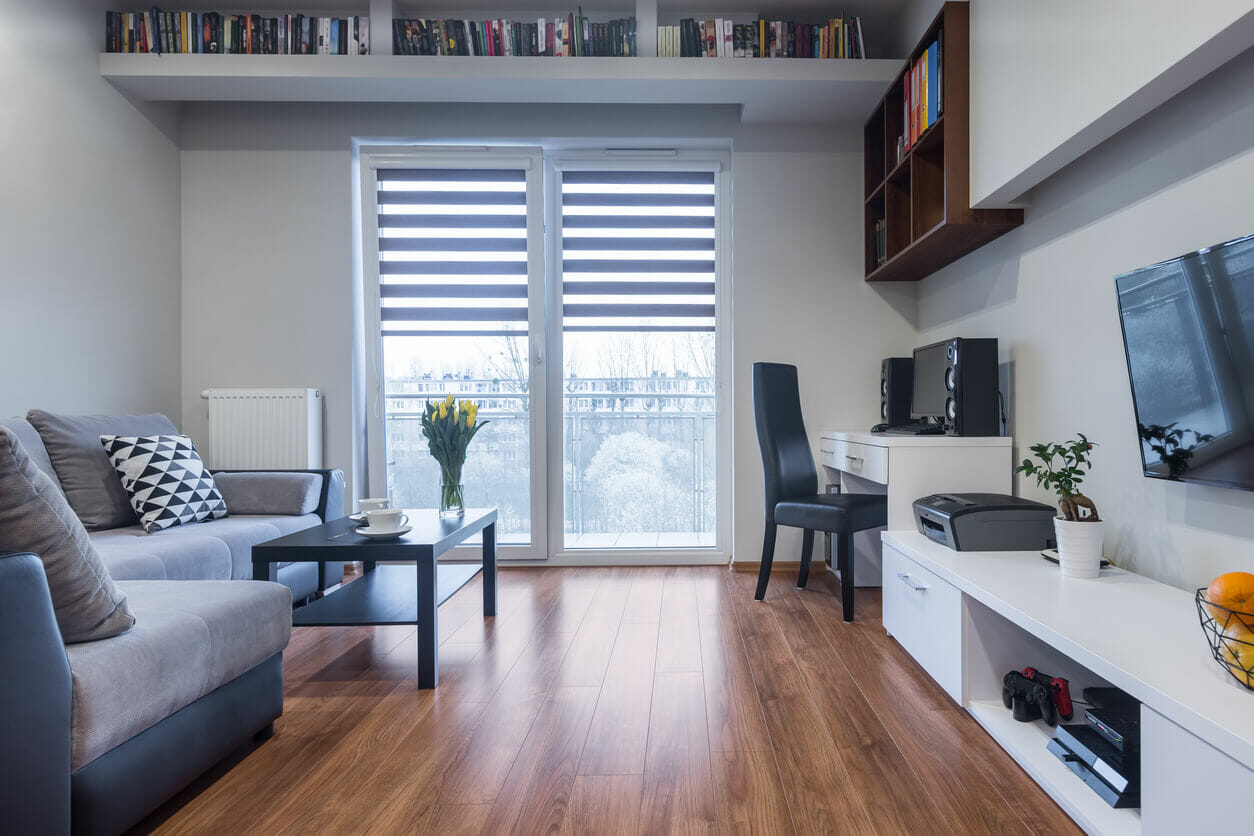Condo rental markets can be fiercely competitive, depending on where you are looking.
For instance, in larger cities like Toronto and Vancouver, showings may attract dozens of interested candidates. Renters often feel pressured to accept a unit without even conducting a thorough inspection of the place.
Quieter cities provide renters with more choice and more time to make a decision. Condo rental rules may be more relaxed in less populated provinces since these markets don’t need to be as heavily regulated.
Regardless of where you’re looking to lease, this article can help you prepare for your next application and give you some much-needed information about renting out a condo unit.
Renting a condo vs. an apartment
There are a couple of differences between renting out a condo unit versus an apartment. Condos are owned by individual unit owners, but apartment buildings are owned by a company (or person). That means renters living in a condo will have different landlords, whereas renters living in an apartment will have the same landlord.
There are also separate rules that govern condominiums in addition to any local or provincial statutes. Renters and owners must follow the laws created by their corporation. Renters are strongly encouraged to ask about the condo’s rules and bylaws before they sign a lease.
There may be some rules that the renter can’t live with. For example, if the building does not allow any smoking at all, a renter who smokes regularly would need to know this before moving in. They probably would not agree to rent in that building once they become aware of this rule.
What you need to bring
When submitting a rental application, most unit owners will also want to see the following:
Credit report
Credit reports give the owner an idea about how well you manage your finances. If you are working with a realtor, they will go through your credit report before you submit your application and help you address any potential inaccuracies or issues.
Employment letter
An employment letter discloses the stability of your job and your annual income and helps the owner determine if you can afford the property. If you’re self-employed, you may be asked to present your Notice of Assessments from Revenue Canada to the unit owner.
References
Include at least two people. Ideally, they are either former landlords, or they have lived with you in the past. Let the references know in advance that they should be expecting a call from the owner you are hoping to lease the unit from.
Lease agreement
A lease agreement is an offer agreement that states your lease terms, including the conditions and duration of the lease, price, etc. Most owners will not ask for a lease agreement from a tenant, but if the price of rent is up for debate, you may submit this document.
Condo rules apply to everyone who lives in or visits the building
As mentioned earlier, condominiums have their own set of rules. They are commonly referred to as the declarations, bylaws and rules. All items in the governing documents must be consistent with the Condominium Act.

Tenants must abide by the same rules as owners, but they also have many of the same rights. For example, renters can book and use amenities just as owners do. The unit owner has a duty to ensure their tenant complies with the condominium rules.
Owners should give a copy of the declaration, rules, and bylaws to an interested renter before the lease agreement is signed. Renters should know exactly what is and isn’t allowed in the building so that they can decide if this is the right place for them.
Common control rental rules
Most renters living in a Canadian condo will encounter these rules:
Renters need insurance
Even if the landlord has their own insurance for the unit, tenants need insurance for their personal possessions and liabilities. The Insurance Bureau of Canada estimates that about 50% of renters in Canada don’t have insurance.
Renters may pass on insurance because they simply don’t want to pay for it, or because they think their stuff isn’t valuable enough to insure. But if a flood or fire were to occur, and renters were forced to evacuate, it would be up to them to pay for temporary accommodations if they did not have insurance.
Some landlords may require renters to purchase insurance, but, even if it isn’t mandatory, it’s always a good idea.
Renters may pay condo fees
Owners are obligated to pay condo fees, even if they are not living in their unit. They may increase the cost of rent so that the tenant ends up covering at least some of the fees. A leasing agreement can detail whether tenants will be taking care of any condo fees. Owners will usually continue to pay for property taxes and property insurance.
Owners often take care of maintenance and repairs
Owners will usually take care of bigger repairs and condo maintenance (broken appliances, plumbing issues, flooring, etc.) while tenants change light bulbs, replace filters and keep the place clean. But that isn’t always the case. Both parties should be clear about who is responsible for what.
Pets may be allowed, even if the owner says they are not
Not all landlords are favourable to pets because they leave fur behind. Pets may also damage baseboards, curtains or screens. As a result, some owners will include a “no pets” clause in the lease agreement. However, in many cases, this clause is unenforceable if the condominium does not abide by this rule.

Owners cannot evict tenants for having a pet in a pet-friendly condo. That being said, you don’t want to have a fractured relationship with your landlord either. If the owner doesn’t want pets in their unit, and you are a pet owner, it’s best to look for another place to rent.
The owner may enter the unit without notice
There are certain circumstances where an owner can legally enter their unit without giving the tenant any notice. Owners can enter if:
- There is an emergency
- The tenant consents to the landlord entering the unit when the owner shows up
- The tenancy agreement requires the landlord to clean the unit regularly
- The landlord and the tenant have agreed the tenancy will end, or one party has given notice of termination to the other. The landlord may enter the unit to show it to prospective tenants. However, it is in their best interest to give notice so that the tenant can tidy the place ahead of time
An owner cannot enter the unit without notice to perform repairs, even if the tenant has requested the repairs, unless the landlord obtains the renter’s consent to enter the unit when they show up.
Rent increase
Rent control is a bit different for each province. It’s common to see strict limits in areas that are more densely populated. But most provinces state that landlords must wait 12 months after a tenant has moved in, or 12 months since the last rent increase, before increasing rent.
In Ontario, the maximum increase amount is regulated based on annual guideline limits set out by the Ontario Ministry of Municipal Affairs and Housing. The number is based on the Ontario Consumer Price Index. In 2022, the limit will be 1.2%.
Unfortunately, new residential buildings, including condos, that were occupied for the first time on or after November 15, 2018, are not rent controlled. Landlords can increase the rent year-to-year to whatever they want.
In Alberta, the Residential Tenancies Act applies to most people who rent out their condo units. The Act sets out the rights and responsibilities that apply to landlords and tenants. There is no limit on how much a landlord can increase the rent in Alberta. However, an owner can only increase the rent after a year has passed from either the start of the tenancy, or when the last rent increase was made.
British Columbia follows a model similar to Ontario’s. Owners can raise rent in 2022, but the hike will be capped at 1.5%.
Rent increases are not automatic, nor are they mandatory. Landlords must give tenants at least 90 days’ written notice, using the correct form. If a tenant believes they have received an improper rent increase, they may dispute it through the Landlord and Tennant Board.
It is possible for a tenant to request to have their rent decreased. This will only occur if very specific criteria are met. Applications must be submitted to the Landlord and Tennant Board.
Conclusion
Many renters are unaware of their rights or obligations, but they are not powerless. An informed renter will have an easier time identifying trustworthy landlords and finding a great place to call home. That’s why all renters should be familiar with local and provincial rental rules.


